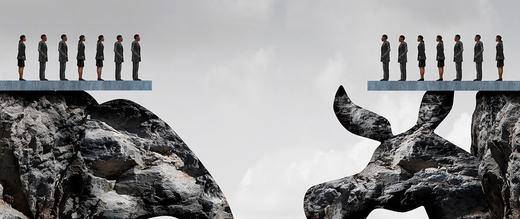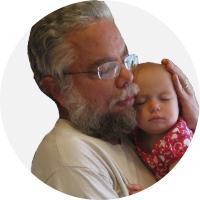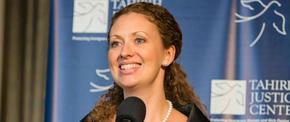The views expressed in our content reflect individual perspectives and do not represent the authoritative views of the Baha'i Faith.
At the outset of every endeavour, it is incumbent to look to the end of it. – Baha’u’llah, Tablets of Baha’u’llah, p. 168.
Political parties, wherever they operate, often thrive on division.
Political parties attempt to separate us into artificial factions or tribal units that oppose something or someone else, polarizing the population and pitting us against each other. If I’m a Democrat and you’re a Republican; or if I’m a Whig and you’re a Tory, or if I’m a socialist and you’re a capitalist, or if I’m liberal and you’re conservative, then we have both labeled ourselves with a partisan affiliation and automatically drawn a dividing line, creating a border and a barrier between us.
Ultimately, that doesn’t really benefit us much. It separates us into camps; produces conflict and divisiveness; generates hard feelings and anger; and can even degenerate into contention and violence. Like good and bad or black and white, the reality usually lies somewhere in between. Even though we may label ourselves with a party affiliation, we may not be that far apart in our views; or we may agree on most things and only disagree on a few. Political systems, though, capitalize on our disagreements. They promote a team-based approach to life: either you’re on my team, or you’re on the opposing team. You’re a part of the right team; or you’re The Other, meant to be defeated and crushed.
So who does the partisan political system benefit? Well, if we take Baha’u’llah’s advice and “look to the end” of every endeavor at its outset, we can see that partisan political divisions ultimately benefit those who want power. The partisan political system generates a continuing condition of disunity and conflict as a way to gain and keep power. Those partisan political divisions drive us apart, and that keeps us in constant low-level warfare with each other, unaware and unwilling to try a more unified approach to solving our common problems.
In many places, we simply accept that state of affairs without questioning it. Most people go through their entire lives without ever challenging the idea of a partisan political system, or entertaining any alternatives. But the Baha’i teachings question that system, and ask us to question it, too:
Speak thou no word of politics; thy task concerneth the life of the soul, for this verily leadeth to man’s joy in the world of God. Except to speak well of them, make thou no mention of the earth’s kings, and the worldly governments thereof. Rather, confine thine utterance to spreading the blissful tidings of the Kingdom of God, and demonstrating the influence of the Word of God, and the holiness of the Cause of God. Tell thou of abiding joy and spiritual delights, and godlike qualities, and of how the Sun of Truth hath risen above the earth’s horizons: tell of the blowing of the spirit of life into the body of the world. – Abdu’l-Baha, Selections from the Writings of Abdu’l-Baha, pp. 92-93.
The Baha’i teachings ask us to focus on unity rather than disunity; and to direct our attention to our own inner characters and human souls first:
Let them willingly subject themselves to every just king, and to every generous ruler be good citizens. Let them obey the government and not meddle in political affairs, but devote themselves to the betterment of character and behaviour, and fix their gaze upon the Light of the world. – Ibid., p. 318.
With these passages in mind, let’s look at the latest dividing, diversionary tactic the political system has begun to employ in many places around the world: making a false and dis-unifying distinction between the elites and the populists. The conventional definitions of these two terms usually describe them like this: the elites represent the wealthy, the educated and the powerful; and the populists represent the common people. But today those terms have been manipulated and twisted into other configurations: the elites now represent those elected to run our countries and the world; and the populists suddenly represent those who want a return to nationalism. The world’s elites, according to the new definition, want a global government that will take rights away from people; while populists want home rule and the right to do whatever they want. In this clever disinformation calculus, elites equal bad and populists equal good. Even the label—elites—smacks of propaganda, loaded with emotional content designed to generate opposition and contempt.
Lately, politicians who say they’re populists use this strategy of division to play on people’s fears, and ultimately to attain their own authoritarian ambitions. Don’t fall for it—that’s the classic definition of a demagogue: one who tries to stir up people’s emotions in order to gain power.
In reality, this new tactic, meant yet again to divide us against each other, exploits class resentments and grievances. So when you hear the words elites or populists, watch out. Just like the old divisions, these new ones are meant to manipulate our emotions and play on our fears—and to keep us apart.
To attain some actual societal unity and truly address our problems, we’ll need to move beyond these kinds of false binary categories, party affiliations and the old liberal vs. conservative dichotomies. We will need to discover the deep reality of our oneness, find common ground and unify humanity:
The first teaching is that man should investigate reality, for reality is contrary to dogmatic interpretations and imitations of ancestral forms of belief to which all nations and peoples adhere so tenaciously. These blind imitations are contrary to the fundamental basis of the divine religions, for the divine religions in their central and essential teaching are based upon unity, love and peace, whereas these variations and imitations have ever been productive of warfare, sedition and strife. Therefore, all souls should consider it incumbent upon them to investigate reality. Reality is one; and when found, it will unify all mankind. Reality is the love of God. Reality is the knowledge of God. Reality is justice. Reality is the oneness or solidarity of mankind. Reality is international peace. Reality is the knowledge of verities. Reality unifies humanity. – Abdu’l-Baha, The Promulgation of Universal Peace, p. 372.
Next: Religion and Politics—Can We Keep them Apart?

















Comments
Sign in or create an account
Continue with Facebookor